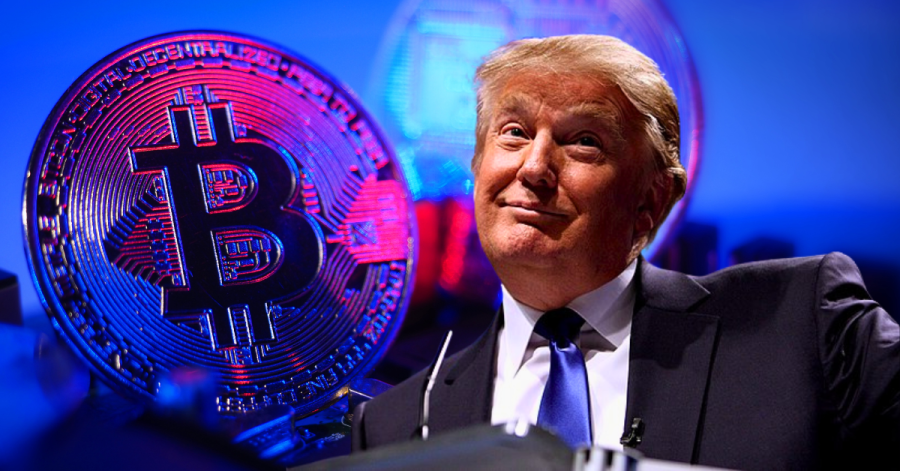Donald Trump is flipping the crypto narrative in the United States. For better or for worse? How will it affect global and European crypto markets? Dive in to learn experts’ perspectives on the matter.
Oh no, Bitcoin is down
After years of regulatory hostility under Joe Biden’s administration—during which the SEC pursued over 100 enforcement actions against the crypto sector—Trump is moving fast to position the US as a crypto-friendly jurisdiction. His administration is rolling back restrictive policies, appointing industry insiders to key regulatory positions, and encouraging major financial institutions to explore crypto trading.
Optimism (and anticipation) around Trump’s actions saw bitcoin rally 57% between Trump’s Election Day victory and Inauguration Day. However, this week, we have faced the first bitcoin decline since November. And there are a number of reasons for that. The recent Argentina Meme Coin Scandal, Trump’s tariffs on China, and the $1.4B Bybit Hack definitely didn’t help.
Besides, while optimism about a crypto-friendly Trump administration initially fueled market growth, investors are now waiting for concrete implementation of regulatory policies. This brings us back to the main talk: Trump’s policy shift and what bigger long-term ramifications it will bring… not only in the USA but globally—particularly in Europe, where policymakers may be forced to respond.
Positioning the US as a crypto-friendly jurisdiction
Let’s revise what Trump’s administration has done about crypto so far.
A month ago, President Trump signed an executive order establishing the administration’s policy shift toward a more crypto-friendly regulatory environment.
One of the first signs of this was the SEC’s new chairman’s decision to form a “Crypto Task Force” to define clearer crypto regulations. Among the changes that came along, one of the most important was the rollback of SAB 121, a guidance document that required entities (such as banks) to treat crypto holdings as liabilities.
Nikola Skoric, co-founder and CEO of Croatian cryptocurrency brokerage and crypto-payment processing company Electrocoin, sees this as a critical moment for Web3 in America. “The SEC’s decision to form a new ‘Crypto Task Force’ and roll back SAB 121 is a strong signal that institutional adoption is now a priority,” he says.
Skoric also adds how Trump’s commitment to the sector is “evident through his direct engagement with crypto industry leaders and significant campaign donations from the space.” Crypto companies, including Ripple, Coinbase, Kraken, Robinhood, and Circle, have made seven-figure donations to Trump’s inaugural committee since Election Day. After the inauguration, Trump has also lined a set of strategic appointments, including new SEC chairman Mark Uyeda, and appointing venture capitalist David Sacks as “Crypto and AI Czar.”
US vs. Europe: The regulatory tug-of-war
Why does this matter to us, in Europe? The US’s newfound pro-crypto stance could siphon talent and capital from European markets.
One of the core issues in the US crypto market has always been the lack of regulatory clarity, explains Vyara Savova, a Senior Policy Expert with the European Crypto Initiative. “Businesses in the crypto space have long struggled with unclear guidelines from agencies like the SEC and CFTC.”
For that matter, EU was ahead of the US – the introduction of comprehensive regulatory framework through MiCA (Markets in Crypto-Assets Regulation) brought some complexities (it remains to be seen how it will be interpreted on national levels) but also paved a path toward more transparency and trust in the space.
“For Europe, the US approach matters because of the interconnected nature of the crypto industry and its lack of physical borders“, Savova points out. If the US solidifies its new stance with clear rules—such as the recently introduced stablecoin bill—Savova suggests that Europe may have to soften its own regulatory framework to stay competitive.
“A regulatory shift in the US could influence global policy discussions, including how jurisdictions approach stablecoin regulation, securities classification, tokenization, and the Travel Rule (embodied in the EU through the recently applicable Transfer of Funds Regulation, or TFR), just to name a few. Practically any rules coming from the US will likely serve as the golden standard for crypto regulation, which might push the EU to refine MiCA or similar frameworks further…“
The institutional domino effect
With some experts predicting (pro-crypto) laws coming into existence by this November, the US may become an even more attractive hub for Web3 startups than it is now, Vyara highlights.
Ambitious Web3 startups in Europe now have a rare opportunity to enter the American market. “If the current predictions turn out to be right, in the next few years, the US will turn into the country with the most extensive legal frameworks around crypto,” Savova notes. “Contrary to common misconceptions, that’s precisely what the industry wants.” They won’t move much forward without institutional trust.
And the Trump administration’s pro-crypto push isn’t just attracting startups and venture capital. Wall Street is taking notice, Morgan Stanley’s E-Trade is reportedly exploring crypto trading, Schwab is also mulling a crypto service. Meanwhile, the Czech central bank is even considering a €7 billion Bitcoin reserve—something that would have been unthinkable just a few years ago.
The risks of a Trump-driven crypto boom
Of course, there’s a wildcard factor in all of this: Trump himself. Skoric warns that while the administration moves quickly to roll back regulations, “a sudden shift in policy without clear long-term guidance could create uncertainty.” This recent bitcoin decline is giving us a glimpse of that scenario…
“Trump’s economic policies, including potential tariffs, sanctions, or trade wars, could also impact the global crypto markets. If tensions rise within the key crypto hubs like China or the EU, it could disrupt supply chains or affect cross-border transactions and liquidity.”
Skoric also points out how this aggressive industry support might provoke political opponents to take an even stronger anti-crypto stance in the future, “leading to policy swings that create instability for businesses operating in the space.”
It is also worth noting that the impact of the SEC’s newly formed Crypto Task Force is still unclear. Domestically, it might foster better communication between industry and administration, but it might do more harm than good for international affairs, including the EU. “The question is whether the task force will facilitate a more cooperative regulatory environment between the US and other countries. This topic is deeply intertwined with the current American administration’s broader trade policies,” Savova notes.
Furthermore, there’s also the risk that Trump’s close ties to certain venture capitalists and industry players could lead to favoritism rather than a level playing field.
New Crypto Reality
The US, once a regulatory minefield for Web3 startups, is rapidly becoming an attractive hub again. Europe, which had enjoyed a head start thanks to MiCA, now faces a new reality where it may need to deregulate to remain competitive.
The ultimate question is whether Trump’s crypto push will lead to long-term stability or just another cycle of political whiplash. As Vyara Savova puts it, “The US market, despite its regulatory uncertainty, has remained a global hub for Web3 development—and will likely only cement this position once rules become clearer.”
For now, one thing is sure: the US is back in the crypto race, and the rest of the world is watching closely.







